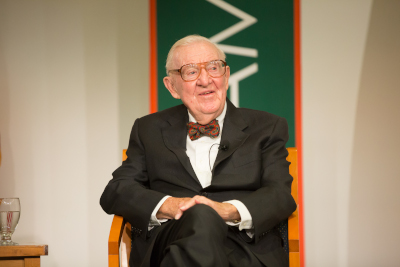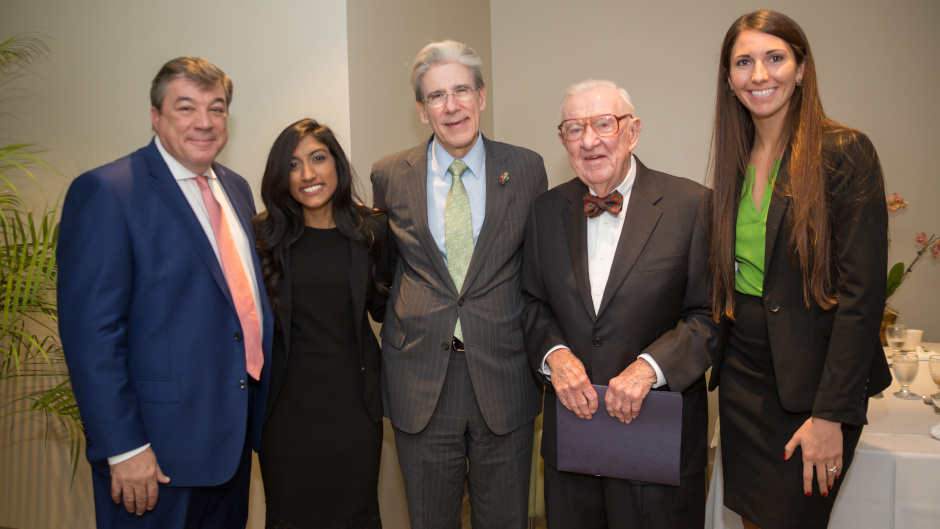In Supreme Court Justice John Paul Stevens’s keynote address at the opening of the University of Miami Law Review’s 2016 Symposium, “The Constitution on Campus: Do Students Shed Their Rights at the Schoolhouse Gates?” the retired Justice discussed seminal cases of student-speech, drawing on his 45 years on the court.
UM President Julio Frenk introduced Justice Stevens to the packed house of law students and local dignitaries. He called the jurist, “a great public servant, scholar, and educator.”
Justice Stevens opened by noting that the symposium topic closely mirrors the 1969 SCOTUS student-speech case Tinker v. Des Moines Independent Community School District. In the case, interestingly enough, Justice Abraham Fortas cited a Due Process case, thereby providing an expansion of the topic.
Justice Stevens continued by comparing the rights granted by the Second Amendment not extending to the public places, such as college campuses as an example when a right is not “shed.” He noted, “Tinker stands for the proposition that student speech cannot be banned because it is based on an unpopular viewpoint or opinion.”
His discussion of Morse v. Frederick, in which a high school student unfurled a large banner at school proclaiming “BONG HiTS 4 JESUS,” the majority held in favor of stifling the speech, not on content, but “perversely, that it permitted censorship based on disagreement with the speaker’s viewpoint.” he said. Justice Stevens wrote on dissent, “I saw no reason why the subjective views of the state officials should control the extent of the First Amendment protection on campus, when listeners’ perceptions do not determine the scope of First Amendment rights in the other contexts.”
 Justice Stevens shared his dissent, saying, “most students…do not shed their brains at the schoolhouse gate, and most students know dumb advocacy when they see it.” Although Justice Stevens realized the risk involved in strong First Amendment protections, he said, “we must undertake that risk of openness because it is the basis of our national strength.”
Justice Stevens shared his dissent, saying, “most students…do not shed their brains at the schoolhouse gate, and most students know dumb advocacy when they see it.” Although Justice Stevens realized the risk involved in strong First Amendment protections, he said, “we must undertake that risk of openness because it is the basis of our national strength.”
He also briefly discussed the implications that “the Court’s most unfortunate decision in Citizens United” might have on students. He worried that students may wonder why First Amendment protections are so strong for corporations influencing elections and not for those students when they walk through the schoolhouse gates.
The Honorable Adalberto Jordan of the United States Court of Appeals for the Eleventh Circuit acted as moderator for the question and answer portion of Justice Stevens’ address. Judge Jordan—who clerked for Justice O’Connor while Justice Stevens was on the Court—characterized Justice Stevens as an “independent” and “deep-thinker who endeared himself to so many people.”
The University of Miami Law Review Editor-in-Chief, Ravika Rameshwar, gave the opening remarks for the Symposium. She set the tone for this event and aptly noted, “in the past 10 years, social media has acted as a catalyst for student expression and social change.”

